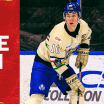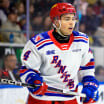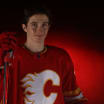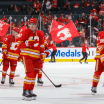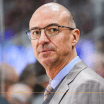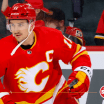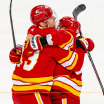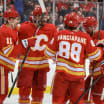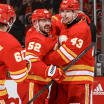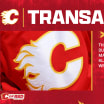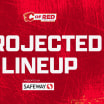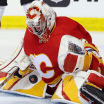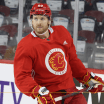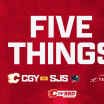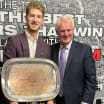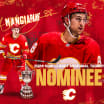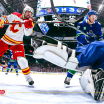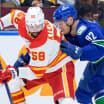The freshly-minted Western Hockey League's all-time career coaching wins leader won't go as far as to say he flat-out knew a quarter-century ago that the rangy, checking centreman from Cranbrook would someday join the fraternity.
But there were indications.
FLAMES EXTRA - BRINGING THE HEAT
Ryan Huska's journey to coaching was a unique one and has helped him develop the Stockton Heat Pipeline this season
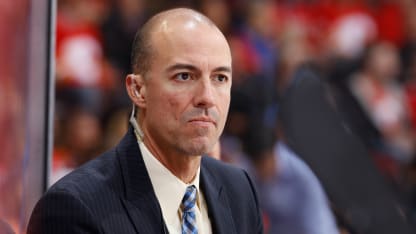
By
GEORGE JOHNSON @GJohnsonFlames / calgaryflames.com
"As a player, Ryan was always a details guy,'' Don Hay is recalling, via cell phone, as the Kamloops Blazers bus rolled north through snow on its four-and-a-half-hour trek to Prince George. "Someone who really understood the game. Who knew his role and played it well.
"He just continued to learn. Took his time moving ahead, growing, and became a smart, organized coach who understands today's players.
"I think his role in junior hockey certainly helped in that development. He was always the guy who got all the really tough assignments as far as match-ups, shutting down top people on other teams. So he had no choice but to grasp the game, especially from the defensive side.
"Solid penalty killer, good faceoff guy.
"Not flashy but really dependable in all situations.
"After he retired as a player, he got into coaching at Kelowna with Marc Habscheid, he learned the right way and to create his own model, which is a real strength.
"So to see him coaching now, no, no, it doesn't surprise me at all."
Currently in his fourth season in charge of the Flames top minor-league affiliate, one spent in Abbotsford, B.C. and the past three in Stockton, Calif., Ryan Huska's fingerprints can be seen all over the Heat.
Despite a slew of call-ups of important components by the parent Flames, Huska has the Heat within hailing distance of the Pacific Division-pacesetting Tucson Roadrunners.
Those formative years in Kelowna helped shape him, first as a player and then as a tactician.
The Blazers at the time turned out hockey players at the rate of Italy turning out tenors or Switzerland producing chocolate.
Future NHLers that featured in the 'Loops during Huska's time there included Jarome Iginla, Darcy Tucker, Shane Doan, Brad Lukowich, Tyson Nash, Nolan Baumgartner and Jason Strudwick.
The franchise collected an astounding three Memorial Cup titles over his four-season run at the Riverside Coliseum (now Sandman Center).
"I was lucky, really luck, in my time in Kamloops to have Tom Renney as a head coach my first year and then Don Hay for the last three,'' emphasizes Huska.
"To be a 16-year-old and be around Tom Renney, with his grasp of the game, was just invaluable. As a minor-hockey age you don't learn how to play, you just … play. Then all of a sudden I get to Kamloops and there are
"How Tom understood the game, the way he implemented things, where he tried to take our team, made a huge impact on me.
"Don was then able to kinda take it all a step further.
"In Kamloops, I learned the compete side and a team concept. It was like getting a university degree."
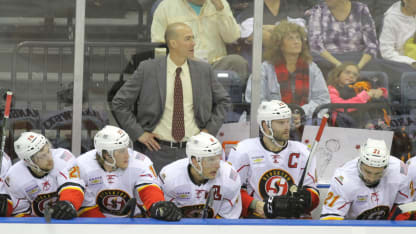
The title-winning teams each provided their own lessons for the future.
"All,'' reminisces Huska, "had their moments. All were different. The second or third ones would have more value to me. On the first, I was a 16-year-old, in and out of the line-up.
"The second one, the first with Don, we were actually gearing for next year, so that was kinda cool, winning the Cup as a group not expected to really do anything.
"And then the third year, we were the host team, rated the one to beat by everybody all season. At the time we had what was called the Tip Top 10 for the CHL, ranking the teams. We opened the season at No. 1 and managed to stay there the entire year.
"Looking back on that team, the players we had, just a real special group. And then to win in front of our fans in Kamloops, pretty tough to top."
Drafted in the third round, 76th overall, by the Chicago Blackhawks at the '93 entry draft, Huska's pro career was spent virtually entirely in three minor-league stops, as part of the Indianapolis Ice, Lowell Lock Monster and Springfield Falcons.
The story has been oft-told of his one and only NHL appearance, Jan. 5, 1998 for the Hawks against - naturally - the Flames, at the United Center. Nothing more than a fleeting glimpse: Eight shifts, 5:51 of ice time before being dispatched back to the IHL Indy.
"After my first year pro, I'd say, I began making mental notes on what you like and you don't about what coaches have done. Once I really had a good idea that I wasn't going to be an NHL player, you start paying even more attention to the coaching side, for sure."
Huska had promised his dad that by age 25, if NHL ambition hadn't yet blossomed into NHL reality, he'd go back to Okanagan University College and complete his financial degree.
And he lived up to his word, retiring as a player after his one season in Springfield.
"I went back to school and was fully expecting to get out of the game and into the finance industry - I was working at RBC for a great investment advisor, learning the ropes - and then Marc Habscheid approached me about getting involved coaching part-time with the Kelowna Rockets and my love of the game was revived.
"I was on my way being out the door of the hockey business entirely and then the part-time job popped up when I was finishing my last year of school.
"Kind of weird how it shaped out."
The assistants gig in Kelowna lasted five years after which Huska took control of the Rockets for an additional seven, reaching the Mem Cup final in 2009 only to lose 4-1 to the Windsor Spitfires.
In 2014, he was hired by the Flames to take over the reins in Abbotsford and shifted along with the organization to Stockton two-and-a-half seasons ago.
The influx of Heat-seasoned players to the big club this campaign - Brett Kulak, Mark Jankowski, Garnet Hathaway, David Rittich, Andrew Mangiapane, Ryan Lomberg, Marek Hrivik - is testament to that individual "model" that old mentor Don Hay spoke so admiringly of.
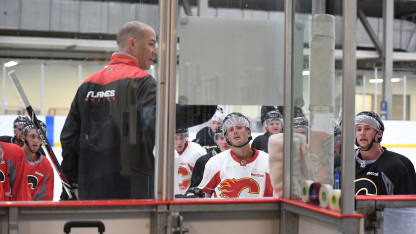
"At this level, you're classified as a developmental coach and your job is to make sure you're ready to play at the NHL level. But it is also to teach them how to win.
"In doing that, you're sometimes putting people in positions they might quite not be ready for when, say, you also have an older player on the bench who could get that same job done and it's late in the third period of a close game.
"So sometimes you take your lumps putting people in positions to give them experience and hopefully get them to the point that eventually they could do that job for the Calgary Flames.
"It can be a challenge, yes, but it's also very fulfilling when you see players having success like some of our guys are now for the Flames."
Those guys provide the rest with hope.
"There's a sense of pride for everybody here when one of our players is called up, especially that first time,'' says Huska. "And particularly a guy you've worked really hard with. Like, say, a Ryan Lomberg. When he got called up the first time, I gave him a hug. You're proud of them. You're excited for them.
"These are motivated people. They do the bulk of the work, obviously. But as coaches you do feel connected to them, for sure.
"Those are good days."
There are the bad days, too. When veterans, having been called up and feeling their time at reaching the dream dwindling, are sent down again. When the team's on a dip in form. When the message maybe isn't getting through.
Coaching in professional sport is a day-to-day, no-guarantees, high-stress job, even in a developmental situation.
Does Huska, then, ever, maybe deep down, secretly pine for a career in investment advising, at RBC, accruing that retirement pension and working 9-to-5?
"That's a good question. Well, sometimes, I guess,'' replies Huska, laughing. "There are challenges, of course, but as coaches we love what we do. I mean, I think in any job there are moments where you're like 'What am I doing here? What have I gotten myself into?'
"I think in my case that might be true one or two per cent of time.
"Which means that 98 percent of the time I absolutely love what I'm doing.
"And that's a pretty good percentage, I'd say."

